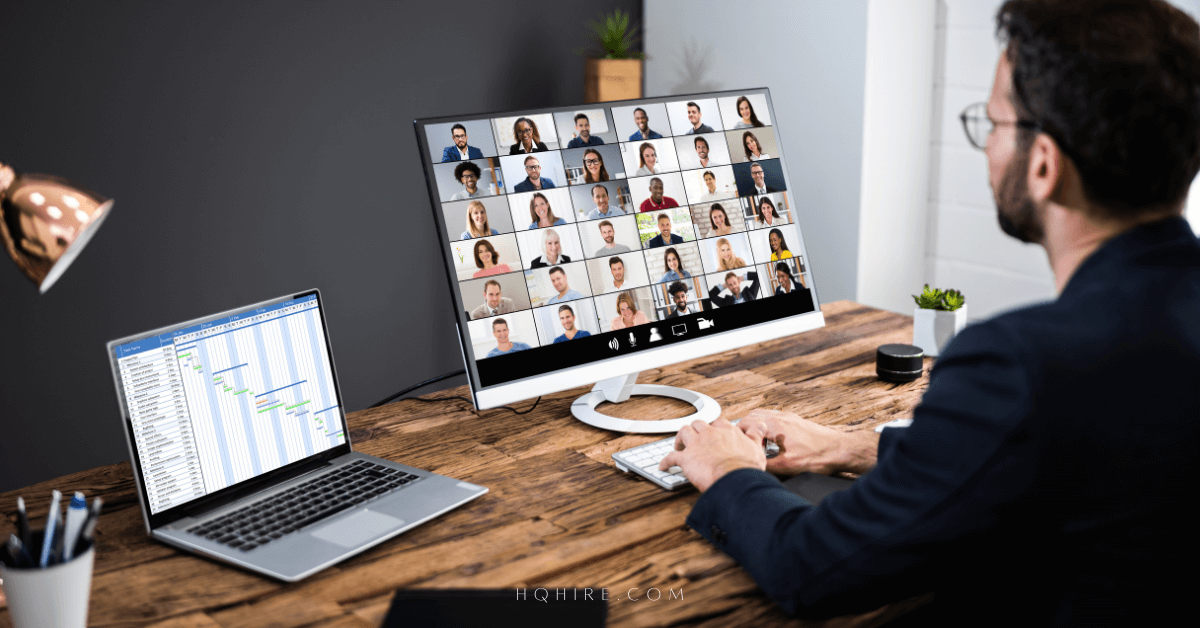Working from home can be fun and has many benefits such as lower commuting costs and having more spare time to spend with your family, exercise, and practice your hobbies.
At the same time, working from home means that they are tempted by common distractions such as attention-seeking children, noisy housemates, watching TV, running errands, and an enticing social media feed.
If you want to be productive while working from home, it is important for you to know how to avoid distractions while working from home.
How to stay focused and avoid distractions while working from home
Although there are many ways to avoid distractions while working from home, these are some of the best practices that can be implemented quickly in order to stay focused on your work.
It does not matter whether you’re a high-flying corporate executive or a junior employee trying to impress your boss during your first full-time job.
Here are a few best ways to avoid distractions while working from home so that you stay focused and motivated to get the job done.
1. Set boundaries
When working from home you may find that you, and the people you live with, would benefit from a clear set of boundaries.
Not only will they know when you’re ‘on the clock,’ but you will also have clearly-defined working hours that ensure that your working life does not creep into your non-working world.
You are the person who best knows when you’re most productive, so you need to create boundaries that allow you to thrive in the manner that suits you best.
Here are some practical ways to help you maintain workplace parameters:
- Communicate. Let others in your house know when you’re working and how their behaviors affect your productivity. Set times that they can disturb you, or limit it to a non-distracting format such as text messages.
- Avoid unproductive calls. If you don’t use your telephone for work, set it to ‘do not disturb’ during your busiest or most productive times during the day.
- Update your status. If your company uses project management or collaboration tools such as Slack, Microsoft Teams, or Facebook Workplace Groups, you can manage your public status so that your co-workers know whether you are open to communication or would prefer not to be distracted. You can also indicate which method of communication you prefer.
- Understand yourself. Know your triggers for time-wasting behaviors. You may need to take some time to reflect on what stressors are likely to drive you to a non-work distraction. Once you have figured this out, you can work towards managing your emotions with positive thinking and anti-stress techniques such as guided meditation or breathing exercises.
- Switch off. Keep your non-work devices out of sight so you won’t be tempted to check your social media feed.
2. Take regular breaks
If you give yourself permission to take a mental and physical break away from your desk, you’re more likely to be refreshed when you return to the task at hand.
A great way to make the most of your break time is to keep yourself active.
A simple 10-minute yoga self-care program can help to enrich your mind, body, and spirit.
3. Get your body moving
Research published in the International Journal of Workplace Health Management (IJWHM) has found that people who exercised during the workday experienced more positive moods which they felt was a key component in their improved productivity and workplace performance.
Inserting targeted bursts of exercise throughout your day is a great way to keep your brain producing endorphins, the neurotransmitters that contribute to happiness and a good mood.
If you’re an early bird, there’s nothing stopping you from setting the alarm 45 minutes earlier than normal and getting out of the house and into the fresh air for a brisk walk before work.
And if you take your dog with you, they are more likely to tire themselves out and be happy to take a nap while you start your workday.
4. Create a dedicated workspace
If you’re lucky enough to have an office at home, the best thing you can do is shut the door while you’re working.
If you don’t, you can get creative and fashion a dedicated workspace somewhere in your home.
Here are some tips to keep distractions at a minimum in your workspace:
- Keep it out of the bedroom. This is a space for relaxing, unwinding and practicing self-care.
- Keep it in the same location. While you might be tempted to sit on the couch or take your laptop to the table out in the sun, moving your workspace decreases productivity. This is because every time you move or complete a non-work task, your brain needs time to get back into ‘work mode’.
- Put up a barrier. If you can’t find a nook or corner to set up your workspace, erect a screen to mark out your space.
5. Block online distractions
In the digital world that most of us are immersed in, online distractions are constant and addictive, but also avoidable. The key is to understand what distracts you the most and avoid it.
One option is to go cold turkey and block all of the sites that distract you.
Another option is to set aside a block of 10 minutes twice a day where you allow yourself to check your favorite feeds and message your friends.
6. Organize your day
A great way to avoid distractions is to have your day organized with set tasks and deadlines by structuring your workday. You can do this in any number of ways, and the most important thing is to find the one that works best for you.
Schedule your workday by creating work blocks
One of the best ways to organize your day is to create work blocks.
- Divide your workday into “blocks” of time.
- List down each of the tasks you need to do for your workday.
- Rank each task according to its importance.
- Write down the time required for each of the tasks to be completed.
- Place each task into “blocks” of your workday.
With this system, you can delegate specific tasks to each block of time. What’s more, you can schedule the more challenging tasks for when you are most productive.
Schedule time for building rapport with your coworkers
Working from home means that you no longer have regular, face-to-face ‘water-cooler’ chats. Your day is not just about getting work done but ensuring that you schedule a time to socialize with your colleagues.
There’s nothing stopping you from scheduling a daily group video chat or setting up a ‘Keeping our chins up’ channel on your workplace’s project management or collaboration platform where you can post humorous news or keep track of the fantasy football competition.
7. Keep your workspace organized and free of clutter
Clutter breeds distraction. For many people, a messy desk is a normal way of working, but it is also one of the great workplace distractors.
Don’t let the fact that your colleagues can’t see your desk keep you from maintaining organization and order.
You may well ‘know where everything is’ amidst the piles of papers on your desk, shelves, and floor, but keeping it all filed away allows your brain to focus on the tasks at hand.
8. Practice self-care
If our main reason for avoiding distractions is to maintain workplace productivity, then a long-term approach is the best way to maintain consistent and healthy results.
Making your own mental, physical and emotional health a priority can be hard for many of us who are used to taking care of others. But it is an important way to make sure that you are at your best to achieve your best.
Psychology Today acknowledges that it can be hard to carve out the time to take care of yourself. But it is important to realize that self-care includes showing compassion to yourself by not criticizing your failures or punishing yourself for failing to live up to your self-expectations.
9. Ignore the urge to multitask
Recent studies show that multitasking is not an efficient way to get work done. In fact, it is counter-productive and as distracting for your brain as scrolling on your phone or leaving the desk to hang up another load of washing.
Every time you switch between tasks, it takes time for your brain to catch up and engage with the new errand. This means that it will take longer to finish and you might even be creating inferior work.
10. Organize your children
For most of us, parenting is one of the biggest distractions when working from home. Even if the youngsters spend most of the day in school, the after-school hours can be a struggle.
The key is preparedness. Make a list of potential distractions, and figure out how to diminish, eliminate, or minimize them from happening.
- School-aged children. Make sure you have a series of activities organized and ready so that they can complete themselves with minimum supervision.
- Younger children. You may need to organize a tag-team parental routine where you share the supervision with another adult.
Why is it important to avoid distractions while working from home?
The answer is simple: the more distracted you are, the less productive you are.
Not only does this mean that your quality of work will suffer, but it will take you longer to finish, reducing the amount of time you have to enjoy life away from work.
When you take the time to actively reduce distractions, you:
- Are more productive because you complete your work tasks more efficiently and effectively
- Are more likely to maintain a positive work mindset
- Model good working habits for your family.
Read Also:
- 5 Minutes Online Meeting Games to Foster Teamwork and Engagement Remotely
- 11 Benefits for Getting a Remote Job: Unlocking Flexibility and Freedom
- How to Get Remote Writing Jobs For Beginner (Freelance Writing)
- How to Get a Remote Part-Time Job (Flexibility + Stability)
- How to Get a Second Remote Jobs and Earn a 6-Figure Salary?
Join over 11,000+ achievers who are committed to achieving their career goals!






